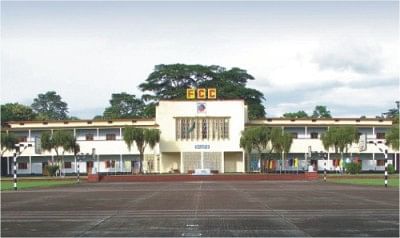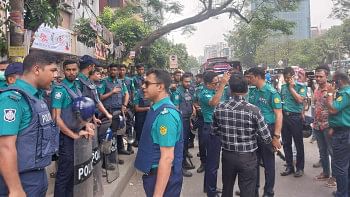Faujdarhat Cadet College: Half a century of excellence

Serving the nation. Photo: star campus
FAUJDARHAT (then "East Pakistan") Cadet College, the most prestigious public school in the nation, was inaugurated fifty years ago. The late Pakistani president, Ayub Khan, who, as the general officer commanding (GOC) of East Pakistan in the 1950s personally selected the site at Faujdarhat, and founded the school for the express purpose of supplying Pakistani armed forces with "East Pakistani" officers.
Over-ruling subordinates who wanted to hire the legendary British headmaster Mr. Hugh Catchpole, General Ayub picked an unknown New Zealander, Lt. Col. William Maurice Brown, as the college's first principal. Ayub could not have made a better choice.
Col. Brown's goal was to make his students as accomplished as he was. Starting with the planning and construction of the infrastructure, through the selection of the very best students and faculty, to the setting of the glorious residential house traditions that persist to this day. His name is synonymous with cadet colleges in Bangladesh. He coined the school's first motto: "Love your country, tell the truth, and don't dawdle." Subsequently, he preferred the simpler "Deeds, not words." Col. Brown convinced his students that it was possible to excel in academics and sports simultaneously.
Although established as a feeder school for the armed forces, Faujdarhat Cadet College first captured the nation's imagination for its academic brilliance. Thanks to the foundation laid by Col. Brown, Faujdarhat Cadet College has so far produced famous professors, vice chancellors, Rhodes Scholars, a head of Bangladesh army, numerous generals, top civil servants, top journalists, actors, national record holders in track, top industrialists and philanthropists, members of the parliament, and a foreign minister.
Offering classes seven through twelve, examinations for admission were conducted in Dhaka and Chittagong in 1957. With construction of the buildings still in full swing, the first of four batches of students was enrolled in 1958. The college was formally inaugurated by Brigadier Qurban Ali on April 28, 1958. Col. Brown arrived in September 1958.
An excellent school requires three essential ingredients -- excellent students, excellent faculty and an excellent administration under a dynamic principal. The very best students were selected through competitive examinations.
Col. Brown was aided in his mission by an excellent native faculty, many of whom were first class honours and masters graduates of Dhaka University. Several Faujdarhat teachers went on to become famous professors of Dhaka University.
An exceptionally gifted and visionary principal, Col. Brown attracted British teachers like a magnet. The first two were Mr. S. L. Croft who taught English, and Mr. O. N. Bishop, a teacher of science. Later, Mr. Watson and Mr. Harry Shutt taught English, and a Scot, Mr. Macbeth, taught physics.
Several British Voluntary Service Overseas (VSO) boys, taking a year off before going to college, lived with the students in the houses. Although an excellent geographer, Col. Brown did not teach classes. Blessed with such a stellar and inspiring faculty, students had no excuse for failure.
Col. Brown placed enormous emphasis on sports and other extracurricular activities. Everyone took part in football, cricket, rugby, hockey, basketball, boxing, swimming, gymnastics, and track and field. Every autumn, students ran the steeplechase.
Col. Brown would use his enormous clout to bring famous sports personalities to the college. Pakistan's Olympic gold medal-winning hockey team visited FCC in 1960 and presented the college the hockey stick that had driven in the winning goal. In 1962, during the rest day of the Dhaka test against Pakistan, the English cricket team visited and gave students lessons in bowling and batting.
Camping and adventure were also mandatory extracurricular activities. Every year, students went to Rangamati for camping. In 1959 and 1960, we went to Old Rangamati before it was submerged by the Kaptai Dam. We swam in the Karnaphuli River and, in 1959, were invited by Raja Tridiv Roy to a sumptuous dinner. Every year, beginning in 1962, the students spent one full week at new Rangamati's Outward Bound and Adventure Training Camp, a wilderness survival camp on the Rangamati Lake, under the tutelage of Mr. MacGregor and the VSO boys.
Col. Brown envisioned that students undergoing full cadet college training would not become bookworms but be all-rounders, well read, and good in sports, who would be active participants in any gathering anywhere, at home or abroad.
Moulding students in his own image, Col. Brown attempted to make his students citizens of the world. Students were trained not only in the finest tradition of Bangladesh, but also in the best of tradition of the British public schools. While residing in Faujdarhat, they were tuned to the world, near and far
When a devastating cyclone and tidal bore hit coastal Chittagong in the autumn of 1960, Col. Brown suspended classes for a week and made students help reconstruct houses for the poor in the neighbouring villages, earning profuse praise from the press and then-governor Azam Khan.
When President Kennedy was assassinated in November 1963 and Sir Winston Churchill died in January 1965, students observed a minute of silence in their memory. In February 1964, Col. Brown sent the wonderful news to every class: "Cassius Clay has knocked out Sonny Liston!"
Col. Brown taught his students gentlemanly etiquette: "When eating, do not put your knife in your mouth, (just as Herbert teaches Pip in Great Expectations)" and "When you shake hands with a man, look him in the eye and give him a firm handshake. Be gentle with a lady!"
Every morning, students were awakened by the bugle and went for the morning drill. After breakfast, if it was Monday, they would gather at the Assembly Hall for the principal's lecture. He would tell students about what they did right and what they did wrong, and about upcoming events. If sports contests had taken place over the weekend, he would congratulate the winners by name. Classes would be followed by lunch, rest period, afternoon sports, evening prep classes, dinner and "Lights Out!"
Realising that rich boys were showing off their fancy clothes on Sunday, Col. Brown made students wear uniforms every day. "If you are a Muslim, you have to go to Friday prayers," Col. Brown would thunder at the Monday morning assembly, which would always follow the singing of the national anthem. On Fridays, students would walk to mosques in and around Faujdarhat. Fasting was optional. Christian boys went to a Chittagong church on Sundays.
In the early years, students went hunting birds with air guns on Sundays. Until 1960, students swam in the Bay of Bengal without lifeguards, blissfully oblivious of the dangers. Col. Brown put a stop to this when reports of sharks infesting the area reached him. Running to Faujdarhat beach as an afternoon drill was a regular feature.
The nation first learned of FCC through its excellence in public examinations. Mujibur Rahman placed within the first ten in the whole of East Pakistan in the Matriculation Examination of 1961; Salauddin stood 11th in 1962.
When the Matriculation evolved into Secondary School Certificate (SSC) Examination in 1963, the Intermediates changed to Higher Secondary Certificate (HSC) in 1965, and the whole province was divided into several boards, Col. Brown used his extraordinary influence to force Faujdarhat Cadet College out of Comilla Board into Dhaka Board. "I want you to compete with the very best," he explained to us. Until his departure in the autumn of 1965, Faujdarhat Cadet College was in the Dhaka Board. "East Pakistan Cadet College" became "Faujdarhat Cadet College" only after Col. Brown's departure.
Five out of the top ten positions (including the first three, Adnan, Arshad and Mushfique) were claimed by the writer's class in Dhaka Board's 1963 SSC Examination, prompting the Ittefaq to exclaim on its front page, "Shabash, Cadet College!" Happily, this tradition of academic excellence continues to this day.
Faujdarhat Cadet College faced an existential threat after independence. The prime minister's political secretary wanted to introduce party politics in FCC. When the students boycotted his visit, he abolished cadet colleges in Bangladesh and renamed Faujdarhat Cadet College "Faujdarhat Sarkari College." Under the leadership of Minoo Khadem and his batch-mates, the students fought back. General M. A. G. Osmani, with assistance from General Ziaur Rahman, convinced Prime Minister Bangabandhu Sheikh Mujib to restore cadet colleges in Bangladesh.
Col. Brown told his students that he wanted to see a Faujian win the army's Sword of Honour, a Rhodes Scholar, and an Olympian. Ashraf Hussain of the writer's batch won the short course's equivalent of the Sword of Honour (C-in-C's Cane) and the only two "East Pakistanis" to win Pakistan's lone Rhodes Scholarship, the writer in 1970 and Gowher Rizvi in 1971, were Faujians. Col. Brown was a referee for both.
The writer used to correspond with Col. Brown regularly. An unfamiliar handwriting replied to one of the writer's letters in 1975 when he was at Oxford: "Maurice made a fine speech and then collapsed and died." It was signed Beryl Brown, FCC students' beloved "Mrs. Brown."
Last November 27, the writer visited his alma mater and addressed the students and faculty. The writer spoke for only 20-25 minutes so as to leave plenty of time for students to ask questions. FCC had switched to English medium recently and the writer insisted that students ask him questions in English. The writer was immensely impressed with the students' enthusiasm and eagerness to learn. They asked the writer so many very intelligent questions that, had lunch not intervened, we could have gone on for hours!
Nestled between the Bay of Bengal and the hills two miles inland, Faujdarhat Cadet College's setting is idyllic. It is connected by road, sea, railroad and air, not only with the rest of Bangladesh, but also with the rest of the world. If foreigners were attracted to Faujdarhat fifty years ago, they will find it far more agreeable today. In a globalised world, the college should not only recruit the cream of the crop from Bangladesh, it should also welcome foreign students.
The following epitaph of Col. Brown should serve as inspiration for every new generation of Faujdarhat Cadet College students, teachers and administrators. In seven short years, the genius of this visionary New Zealander transformed a fledgling rural school in Bangladesh into one of the finest educational institutions in the Indian sub-continent.
(This article was printed earlier in The Daily Star.)

 For all latest news, follow The Daily Star's Google News channel.
For all latest news, follow The Daily Star's Google News channel. 



Comments